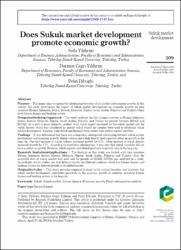| dc.contributor.author | Yıldırım, Seda | |
| dc.contributor.author | Yıldırım, Durmuş Çağrı | |
| dc.contributor.author | Dibooğlu, Pelin | |
| dc.date.accessioned | 2023-05-06T17:19:32Z | |
| dc.date.available | 2023-05-06T17:19:32Z | |
| dc.date.issued | 2020 | |
| dc.identifier.issn | 2399-1747 | |
| dc.identifier.uri | https://doi.org/10.1108/PRR-03-2020-0011 | |
| dc.identifier.uri | https://hdl.handle.net/20.500.11776/11836 | |
| dc.description.abstract | Purpose: This paper aims to explain the relationship between sukuk market and economic growth. In this context, the study investigates the impact of sukuk market development on economic growth for nine countries (Brunei, Indonesia, Jordan, Kuwait, Malaysia, Nigeria, Saudi Arabia, Pakistan and Turkey) which have Islamic finance and banking system. Design/methodology/approach: The study analyzed the data of nine countries as Brunei, Indonesia, Jordan, Kuwait, Malaysia, Nigeria, Saudi Arabia, Pakistan and Turkey for periods between 2014Q1 and 2017Q4. As a part of gross domestic product, total sukuk export measured by the sukuk market and the sukuk density which was considered as annual sukuk export per country were used to determine sukuk market development. Inflation, trade deficit and financial stress series were used as control variables. Findings: It was determined that there was a long-term cointegrated relationship between sukuk market development and economic growth. Sukuk volume and sukuk density had a positive effect on growth in the long run. One unit increase in sukuk volume increased growth by 0.5%, while increase in sukuk density increased growth by 1.7%. According to short-term relationships, it was seen that sukuk variables did not have an effect on growth. However, sukuk exports contributed positively to growth rates in the long run. Research limitations/implications: The findings of this study are limited with nine countries (Brunei, Indonesia, Jordan, Kuwait, Malaysia, Nigeria, Saudi Arabia, Pakistan and Turkey). Also, the accessible data of sukuk market was used and the periods of 2014Q1–2017Q4 was analyzed in a study. Accordingly, future studies can find different results for different countries which has Islamic finance and banking system for different periods in the global market. Originality/value: This study provides empirical findings to the related literature, and it proves that sukuk market development contributes positively to the economic growth of countries including Islamic finance and banking system in the long run. © 2020, Seda Yıldırım, Durmus Cagrı Yıldırım and Pelin Diboglu. | en_US |
| dc.description.sponsorship | This study was presented in ISEFE’19 (International Congress of Islamic Economy, Finance and ethics), April 27–28, 2019 in Istanbul/Turkey. | en_US |
| dc.language.iso | eng | en_US |
| dc.publisher | Emerald Group Holdings Ltd. | en_US |
| dc.identifier.doi | 10.1108/PRR-03-2020-0011 | |
| dc.rights | info:eu-repo/semantics/openAccess | en_US |
| dc.subject | Economic growth | en_US |
| dc.subject | Islamic finance | en_US |
| dc.subject | Panel cointegration analysis | en_US |
| dc.subject | Sukuk | en_US |
| dc.subject | Sukuk market | en_US |
| dc.title | Does Sukuk market development promote economic growth? | en_US |
| dc.type | article | en_US |
| dc.relation.ispartof | PSU Research Review | en_US |
| dc.department | Fakülteler, İktisadi ve İdari Bilimler Fakültesi, İşletme Bölümü | en_US |
| dc.department | Fakülteler, İktisadi ve İdari Bilimler Fakültesi, İktisat Bölümü | en_US |
| dc.identifier.volume | 4 | en_US |
| dc.identifier.issue | 3 | en_US |
| dc.identifier.startpage | 209 | en_US |
| dc.identifier.endpage | 218 | en_US |
| dc.institutionauthor | Yıldırım, Seda | |
| dc.institutionauthor | Yıldırım, Durmuş Çağrı | |
| dc.institutionauthor | Dibooğlu, Pelin | |
| dc.relation.publicationcategory | Makale - Uluslararası Hakemli Dergi - Kurum Öğretim Elemanı | en_US |
| dc.authorscopusid | 56844793300 | |
| dc.authorscopusid | 56127310200 | |
| dc.authorscopusid | 57743982600 | |
| dc.identifier.scopus | 2-s2.0-85103135029 | en_US |



















